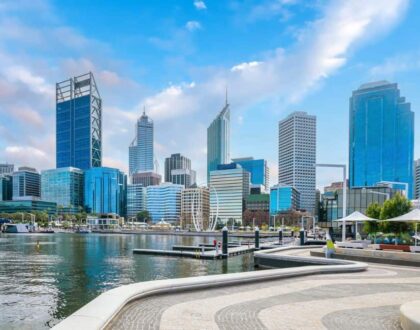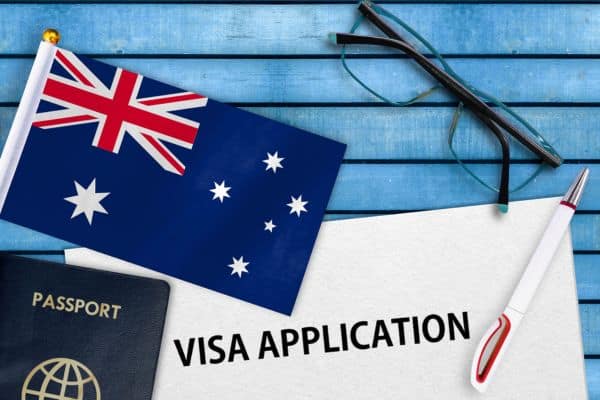Moving to Australia from the UK Checklist

by Hayley
Planning a move to Australia? Our comprehensive ‘Essential Moving to Australia Checklist’ is your ultimate step-by-step guide for a hassle-free transition. From securing your visa to finding your new home, this guide covers every crucial action to ensure your move is smooth and well-organised. Dive into this article for practical steps designed to help you successfully embark on your new adventure down under.
Thorough preparation is key to a successful relocation. Understanding visa options, organising finances, and securing employment opportunities are fundamental steps before making the big move. Our checklist provides detailed insights into each of these areas, ensuring you’re fully prepared for the journey ahead.
You can also simplify your move with professional help. Simpsons International Removals is a leading international removals company and provides an expert international removal service to Australia from the UK. This guide will help navigate new systems, such as healthcare, transport, and housing to make your transition to Australia seamless and enjoyable.
1. Deciding on the Right Australian Visa
Navigating the complex world of Australian visas is a prerequisite to enjoying the warmth of Australia’s sun. With a myriad of options including:
- Skilled visas
- Working Holiday visas
- Business visas
- Family visas
The Australian government has tailored pathways for a diverse range of migrants. Your eligibility hinges on various factors such as age, occupation, and the specific conditions tied to each visa type. It’s not just about picking a visa; it’s about securing your future in a land of opportunity.
Initiating this journey necessitates obtaining a visa that mirrors your aspirations, whether you seek to work, join family, or start a business venture. With opportunities ranging from the vibrant urban life of Sydney to the serene landscapes of Western Australia, the right visa is your golden ticket. Consider the Skilled and Working Visas if you have talents that match Australia’s economic needs, or explore Family and Partner Visas to reunite with loved ones. Remember, your chosen path might lead to the joy of permanent residency, so weigh your options meticulously.
Understanding Your Visa Requirements
Attaining an Australian visa can be compared to piecing together a puzzle, with each document a vital piece. Ensure you have the following documents ready:
- Valid passport that spans your intended stay
- Certified copies of essential identification like birth certificates
- Employment references and an updated CV if you plan to work in Australia
- Necessary business documents if you plan to start a business
- Medical records and financial statements, as they are often prerequisites for visa applications and setting up services upon arrival.
Once you have the necessary documents, you can confidently demonstrate your aptness for life in Australia. Whether you’re a skilled worker or a business mogul, your application is your narrative. It’s your chance to showcase the qualities that make you an asset to the Australian community. So, prepare diligently, for this is the first step in your grand Australian adventure.
Applying for Your Visa
While the visa application process can appear intimidating, a well-structured approach can simplify the journey. Begin your voyage by exploring visa types on the official Australian government website, where you can find the eVisitor visa or Australian Electronic Travel Authority (ETA) suitable for short-term visits. ImmiAccount is your digital companion, allowing you to submit applications, upload supporting documents, and track your progress. Patience is a virtue here; the Australian Department of Home Affairs advises against making irreversible financial commitments until your visa is granted.
For British citizens, the new temporary visa pathway under the Innovation and Early Careers Skills Exchange Pilot (IECSEP) opens doors to skilled work opportunities in Australia, including those seeking a business talent visa. Remember, your application must be complete, with all necessary supporting documents at the time of lodgement, and any non-English documents must be accompanied by accredited translations. To ensure a smooth application process, refer to a UK checklist for guidance. Some applicants will be called to provide biometric identifiers; a digital portrait and fingerprints that further affirm your identity.
2. Organising Your Finances for the Move
As you ready yourself for a fresh start in Australia, streamlining your finances is instrumental in facilitating a smooth transition. The financial itinerary of your move should encompass:
- The costs associated with visa applications
- The journey of your belongings across the seas
- The roof over your head upon arrival
- The sundries that make a house a home
- A nest egg to tide you over until you find employment
It’s a balancing act of budgeting and foresight.
Establishing an Australian bank account while still overseas lays a firm financial groundwork. Watch the ebb and flow of currency exchange rates closely, as timing your transfer can significantly impact the Australian dollars that end up in your pocket. The methods of transferring funds are plentiful, but choosing the right one can save you from the sting of high fees and unfavourable rates.
Opening a Bank Account from Abroad
Picture disembarking the plane and knowing that an Australian bank account is already set up in your name, a financial sanctuary in a new country. You can initiate this process from afar; for instance, CommBank’s Everyday Account Smart Access can be opened up to three months before you land in Australia. Once you’ve touched Australian soil, a visit to your chosen bank branch to collect your debit card and complete any identification checks is the final step in this financial journey.
Banks like National Australia Bank (NAB) and ANZ require you to grace their branches with your presence after arrival, providing identification and your new Australian address as part of the account opening process. With a local account, managing your money becomes a breeze, simplifying everything from rent payments to local purchases.
Managing Currency Transfers
Shift your finances across continents while preserving their worth. Financial services such as Wise safeguard you from the pitfalls of high transfer fees and exchange rates that leave your wallet feeling lighter. Without such services, you may find yourself at the mercy of the market, receiving less Australian dollars than you bargained for. Australian bank accounts usually operate in AUD, with specific policies on foreign currencies that could affect your transfer.
When selecting a currency transfer service, consider the reputability and history of the provider, ensuring you receive the most bang for your buck. A favourable exchange rate isn’t just a nice-to-have, it’s a boost to your financial start in Australia. After all, every saved dollar is another to enjoy in your new life Down Under.
3. Planning Your Relocation with a Moving Company
Relocating from the UK to Australia is not as simple as jumping on a plane; it’s a meticulously planned transfer of all you own to a new corner of the world. Selecting a moving company with a wealth of experience in international removals, such as Simpsons International Removals, is crucial. A company that pledges a smooth transition and offers professional support throughout is worth its weight in gold.
Your removal company should offer a range of services to match your needs, from a comprehensive moving checklist to a free quote service for convenience. Whether you’re headed to the bustling streets of Sydney or the tranquil shores of the Gold Coast, your chosen company should have the expertise to guide your belongings safely to any popular Australian destination.
Keep in mind, while packing your life into boxes requires thoughtful planning, the right assistance can transform this task from an anxiety-inducing procedure to an exciting lead-up to your new adventure.
Preparing Your Belongings
Tackling the task of sorting your belongings is a pivotal step in your relocation. Divide your items into categories for long-term storage, short-term storage, or to donate or sell, streamlining the process of moving. Engage the services of your moving company’s expert packing team to ensure your household and furniture removals are handled with care. This is where the emotional meets the practical, as you decide which pieces of your past will accompany you into your new Australian future.
In the whirlwind of packing, don’t forget the administrative side. Update your new address with relevant companies and cancel any subscriptions that can’t follow you to Australia. As your belongings set sail, you can rest assured that each item is a step closer to making your Australian house a home.
4. Setting Up Temporary Accommodation in Australia
Once you arrive, you will initially find refuge in temporary housing. Australia offers a smorgasbord of options ranging from serviced apartments to homestays that allow you to immerse yourself in Australian family life.
Costs vary depending on location and type, but renting is a practical first step, offering the flexibility to explore and settle. Consider factors like living costs and proximity to your workplace or local amenities when researching Australian suburbs.
Whether you’re after a six-month lease or a shorter stay, understanding the norms of short-term rentals is vital. These arrangements are an opportunity to:
- acquaint yourself with the rhythms of Australian life
- find your footing without the commitment of a long-term contract
- breathe, plan, and explore your options in this vast and varied land.
5. Healthcare Considerations Before You Leave
Amid the flurry of moving preparations, don’t neglect the importance of organising your healthcare. The Australian healthcare system is renowned for its quality and accessibility, but navigating it requires preparation. Private health insurance, categorised into Gold, Silver, Bronze, and Basic tiers, allows you to tailor coverage to your needs. Prices vary, so consider the healthcare costs in your chosen location when planning your insurance.
Before you embark on your Australian adventure, ensure that your insurance coverage, including health insurance, is in order. Ask the right questions when choosing a plan to ensure it aligns with your lifestyle and provides peace of mind for you and your family. After all, good health is the foundation of a happy life, especially in a new country.
Enrolling in Medicare or Private Health Cover
Navigating the Australian healthcare system starts with enrolling in Medicare, the country’s public health program. Here’s how to do it:
- Enroll online via myGov or by completing a Medicare enrollment form.
- Ensure you have a valid visa or citizenship, a current passport or ImmiCard, and visa details from the Department of Home Affairs.
- For family enrollments, gather the details and identity documents of all members.
- For those aged 15 or older, use their own myGov account.
Upon enrollment, your Medicare card will arrive by mail, and a digital copy will be accessible via the Express Plus Medicare mobile app linked to myGov. If you have a newborn or an adopted child, additional documents will be needed for their enrollment. Consider private health cover as an option, especially if you’re looking for a broader range of medical services or faster access to treatments.
Transferring Medical Records
As you transition to the Australian healthcare system, having a comprehensive summary of your medical history is imperative. Here are some steps to follow:
- Secure a copy of your medical records from your current doctor prior to moving to provide a continuous record of your health.
- Verify the accuracy of these important documents, including vaccinations and any ongoing treatments.
- Digitise your medical records to ensure they are easily transferable and accessible for your new local doctor in Australia.
Send your medical records securely, respecting privacy laws related to medical information management. Establishing a medical history with your new healthcare provider will not only facilitate smoother consultations but also ensure your well-being as you adapt to your new environment.
6. Securing Employment in Australia
Securing employment in Australia is a paramount concern for numerous newcomers. Start by refreshing your resume a month before your move, tailoring it to highlight skills that align with Australian employer expectations. Remember, the Australian job market is competitive; persistence and resilience will serve you well as you navigate the nuances of job hunting in a new country.
Consider your resume as your professional identity; ensure it showcases your most pertinent experiences, using keywords that resonate with the roles you’re targeting. Securing employment is more than just a means to an end; it’s about establishing your place within the Australian culture and contributing to its vibrant, diverse workforce.
Building a Professional Network
In the digital age, platforms like LinkedIn are invaluable for professional networking, particularly in Australia, where industry relationships can be pivotal. Here are some tips for using LinkedIn effectively:
- Start building your network from abroad to establish local connections that might lead to job opportunities.
- Keep your profile up-to-date with relevant experiences and skills to catch the eye of recruiters.
- Expand your professional circle by connecting with colleagues, classmates, and industry professionals.
Consider the following strategies to enhance your visibility in the job market:
- Attend industry events and conferences to meet professionals and recruiters in person
- Volunteer and join professional associations to make meaningful connections within your field
- Conduct informational interviews with industry professionals to gain insider knowledge and potential job leads
These strategies can significantly heighten your visibility and increase your chances of finding job opportunities.
Updating Your Resume and Cover Letter
Crafting a resume for the Australian job market is an art form unto itself. Here are some tips to help you create an effective resume:
- Begin with a compelling career summary that highlights your skills, experiences, and notable achievements and hooks potential employers.
- Ensure your work history and education are presented in reverse chronological order, focusing on concrete achievements and the impact of your roles.
- Incorporate a concise list of both hard and soft skills.
- Don’t shy away from adding any projects, languages, or certifications that add value to your profile.
By following these tips, you can create a resume that stands out in the Australian job market.
A polished resume is your first impression, so here are some tips to make it stand out:
- Address any employment gaps with transparency and include any relevant alternative experiences such as education, freelance work, or volunteering.
- Avoid the common pitfalls of poor formatting, a generic approach, and insufficient emphasis on achievements.
- Before submitting your resume, proofread it meticulously to avoid errors that could undermine your professionalism.
- Utilise AI-powered tools for layout, keyword optimisation, and proofreading to ensure your resume is not just good but exceptional.
7. Finding the Perfect Home
Finding a place to call home is one of the most stabilising factors in establishing a life in a new country. Australia’s housing market offers a spectrum of options, with median house prices in the state capitals sitting at around $975,592 and units averaging $669,434.
Cities like Perth, Adelaide, and Brisbane are notable for their growing housing values, with Perth at the forefront of this upward trend. The median dwelling value in regional areas stands at $626,888, offering alternatives to city living.
Whether you’re drawn to the cultural tapestry of Melbourne or the sunny shores of Sydney, understanding the local market is key. Sydney stands as the most expensive, with a median property price of over one million Australian dollars for all dwellings. Engaging with a local mortgage broker or real estate agent can provide the insights needed to navigate these waters and make informed decisions when purchasing a home.
Renting a Property
The process of renting in Australia is relatively straightforward, but it pays to be informed. Rental contracts outline everything from tenant responsibilities to pet regulations, ensuring you understand your obligations. When you’ve found your ideal rental, act quickly to submit your application, providing proof of income, identification, and references to bolster your chances.
Temporary and short-term rentals provide a flexible solution for newcomers, allowing you to explore different suburbs and living arrangements without a long-term commitment. Be aware of the average rental prices, which can vary significantly from city to city—for instance, a studio in Adelaide averages AU$2,188 per month. Establishing relationships with local real estate agents can also smooth the way, providing access to rental properties that meet your criteria and budget.
Buying a Home Down Under
The dream of home ownership in Australia can become a reality with the right preparation. Begin by working out your finances and obtaining a pre-approved home loan, which will set clear boundaries for your property search. Trusted financial institutions like the Commonwealth Bank of Australia and Westpac offer services for prospective homeowners to secure pre-approved loans. This step is crucial before you start viewing homes and making offers.
Partnering with a mortgage broker can demystify the home-buying process, guiding you through loan agreements and the intricacies of the property market. Buying a property not only provides a tangible connection to your new surroundings but also allows you to immediately start putting down roots in Australia, planting the seeds for a lasting presence in your new community.
8. Integrating into Australian Culture and Society
Adapting to the Australian lifestyle can be both thrilling and demanding. The culture may initially seem unfamiliar to expatriates, especially those hailing from the UK. The outdoor lifestyle, including the beach and bush, is central to Australian identity, offering endless opportunities for recreation and relaxation. Be prepared for some cultural nuances as you make new friends; Australians typically value direct communication and have well-established social circles.
While it may be comforting to gravitate towards expatriates from your home country, integrating into Australian society will enrich your experience and understanding of this diverse nation. Embrace the local customs, engage with your community, and you’ll soon find yourself a part of the vibrant social fabric that makes Australia so unique.
Embracing Local Traditions and Holidays
Partaking in Australian traditions and holidays is a delightful way to immerse yourself in the local culture. ANZAC Day, for example, is a poignant holiday that commemorates the military contributions of Australian and New Zealand forces during the First World War, offering insight into the nation’s history and values. Australia’s multicultural fabric is showcased through the celebration of events like Eid al Fitr and Diwali, reflecting the country’s diversity and inclusivity.
Festivals such as the Hung Kings’ Temple Festival highlight the rich tapestry of cultures within Australia, while Easter Monday brings a blend of community events and local traditions to life. Engaging with these celebrations is a fantastic way to connect with Australians from all walks of life and to appreciate the nation’s shared values and diverse origins.
Navigating Social Etiquettes
Understanding and adapting to Australian social etiquette is an essential part of settling into your new life. Australians typically appreciate a direct and honest manner of communication, which can help you form genuine connections. Humour, particularly of the self-deprecating variety, is a cornerstone of Australian interaction and can be a great ice-breaker.
Social events, such as the quintessential Australian barbecue, present perfect opportunities to meet people and establish friendships. Sporting events are also central to Australian life, and attending these can help newcomers understand local passions and traditions. Remember to bring a gift when invited to someone’s home as a gesture of gratitude, and consider joining local clubs and community groups to meet likeminded individuals and forge lasting relationships.
9. Driving and Transportation in Australia
Exploring Australia’s transportation options is an adventure on its own, especially when traveling to Australia from the UK. If you’re coming with a valid driving license, you’ll need to obtain an Australian driver’s license within a specified period, depending on the state or territory. Public transport is a reliable alternative, with trains known for their safety and comfort. Acquiring a public transport card is easy and can be done at convenience stores or transport stations, and registering it online may unlock discounts.
Whether you’re navigating the bustling streets of Melbourne or the scenic routes of Western Australia, understanding the local transport system will enhance your independence and mobility. Embrace the freedom that comes with obtaining an Australian driver’s licence and the connectivity provided by an efficient public transport network.
Getting an Australian Driver’s License
Transitioning to an Australian driver’s license is a rite of passage for many expatriates. In New South Wales, for example, newcomers can use their current license for the first three months before needing to apply for a local license. The application process involves:
- Providing the necessary paperwork
- Proof of identity
- Your overseas license
- Possibly a validation letter
- A payment at the service centre.
Applicants with licenses in languages other than English will need to provide a Transport for NSW-approved translation. Some may need to take knowledge or driving tests depending on reciprocal agreements between Australia and their home country. Temporary overseas visitors can also apply for a NSW license, making it easier to explore the country at your own pace.
Understanding Public Transport Options
Australia’s public transport system is as varied as its landscapes, offering the following options:
- Trains
- Buses
- Ferries
- Trams
Availability of these options depends on the city. Fares are typically distance-based, and monthly travel cards can provide cost savings, especially for frequent commuters including international students. Sydney boasts the only rapid transit system in the country, providing a fast and efficient travel option within the city.
Different cities offer specific travel cards, such as Melbourne’s Myki Card and Brisbane’s Go Card, which can be used across various modes of transport, including ferries in Brisbane’s case. Familiarising yourself with these systems will not only save you money but also time, as you navigate your new environment with confidence.
10. Preparing Children for the Move
Relocating to Australia with children brings additional factors to your preparation checklist. The Australian education system offers a comprehensive range of qualifications, from certificates to doctoral degrees. Finding the right school for your child is made easier with tools like the Australian Schools Directory, which helps locate educational institutions based on various criteria.
Whether your children are starting kindergarten or entering high school, researching and selecting a school that aligns with your family’s needs and values is key to ensuring a smooth transition for your little ones.
Settling into a new school can be a significant milestone in their lives, providing them with new opportunities for growth and learning in a supportive environment.
Enrolling in Schools
Enrolling your children in school is a step towards normalcy and routine in a new country. In Western Australia, children from Kindergarten to Year 12 are eligible to enrol in public schools, with compulsory enrolment in Pre-primary for children who will be five years old by June 30th. Most public schools offer guaranteed places for children within their ‘local-intake area’, making it important to consider school catchment zones when choosing your Australian home.
For families newly arrived in Australia, public schools may accept applications from out-of-area families, but admission is not guaranteed. Intensive English centres can provide extra support for children who need assistance with the language, ensuring they are not left behind academically. By enrolling your children in a school that best fits their needs, you’re providing them with a strong foundation for their future in Australia.
Helping Kids Adjust
Supporting your children through the adjustment to a new country is crucial. Involve them in setting up their new rooms with familiar items to provide comfort and continuity. Facilitate the formation of new friendships by arranging playdates with classmates and neighbours, easing the transition into their new community.
Introduce bilingual books to help maintain their first language, anchoring them in their cultural heritage while they adapt to Australian life. Make language learning a fun and competitive activity, sparking their enthusiasm for embracing Australia’s linguistic diversity. With patience and encouragement, your children will soon start to feel at home in their new surroundings.
Finalising Your Move to Australia Checklist
As the day of your move nears, pause to contemplate the journey you’ve undertaken. From securing the right visa to setting up your new home, each step has been carefully considered to ensure a seamless transition. Researching everything from school catchment areas to job opportunities in line with your skills has been part of this meticulous preparation.
Approach the final preparations in stages, double-checking each item on your checklist. Ensure that all documents are in order, your finances are settled, and your belongings are ready for transport. Remember, this checklist is not just a list of tasks; it’s a blueprint for starting a new chapter of your life in Australia.
Are you looking to move your household belongings to Australia?
Moving to Australia is an exciting venture filled with opportunities for growth, exploration, and new beginnings. This comprehensive checklist has guided you through the essential steps, from understanding visa requirements to integrating into Australian society. Each section is designed to equip you with the knowledge and confidence needed for a successful transition.
As you embark on this new chapter, remember that thorough preparation is key to a smooth and stress-free move. Embrace the adventure, the learning experiences, and the joy of calling Australia home. With this guide in hand, you’re ready to start a fulfilling new life Down Under.
At Simpsons International Removals, we’re here to support your journey every step of the way. Our full door-to-door service includes everything from professional packing to customs clearance and delivery, ensuring a seamless move. Visit our Container Shipping to Australia guide for more detailed information or get an online quote today. Let us help you make your transition to Australia as smooth and enjoyable as possible.
Recommended Posts

The Best Places to Live in Australia for Expats in 2025
Tuesday, 4th March 2025

The Best Australian Road Trips for Adventure Seekers
Thursday, 6th February 2025

Top Tips for Moving to Australia from the UK with Family
Thursday, 28th November 2024







